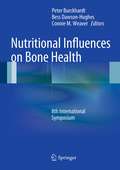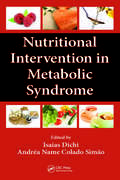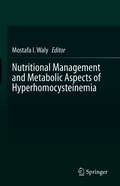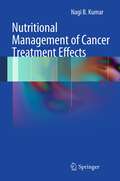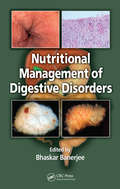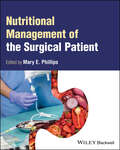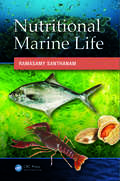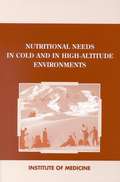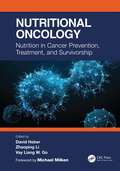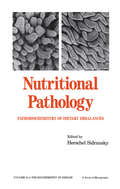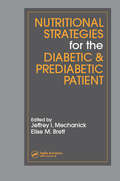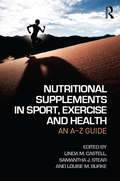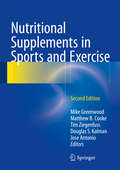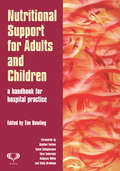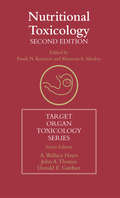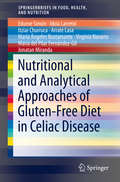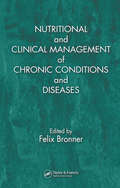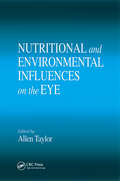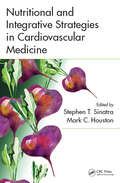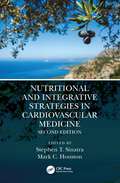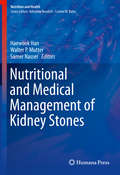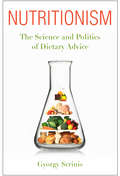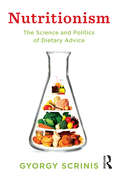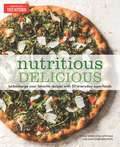- Table View
- List View
Nutritional Influences on Bone Health: 8th International Symposium
by Connie M. Weaver Peter Burckhardt Bess Dawson-HughesNutritional Influences on Bone Health presents a collection of papers from the 8th International Symposium on Nutritional Aspects of Osteoporosis, the primary forum for and only regular meeting exclusively devoted to the topic of nutritional influences on bone health. The outcome is a fusion of the most current and up-to-date research in this area. Key themes include the permeation of the Western diet across the globe, calcium, vitamin D and acid-base balance. Written by authorities on the impact of nutrition on bone health, Nutritional Influences on Bone Health brings the reader the emerging trends, new messages and the latest scientific data in the field, to inform future research and clinical practice. This comprehensive, well researched volume is an essential reference for professionals in the field of bone health and nutrition.
Nutritional Intervention in Metabolic Syndrome
by Isaias Dichi Andréa Name Colado SimãoMetabolic syndrome (MS) is a combination of medical disorders that, when occurring together, increase the risk of developing cardiovascular disease and diabetes. The prevalence of MS is rising in developing countries and developed countries, now considered a pandemic disease. This book presents information on how to treat MS through lifestyle change and nutritional intervention. Chapters cover prevalence of MS; pathophysiology; MS in systemic lupus erythematosus and rheumatoid arthritis; gene-nutrient interactions; MS in adolescents and children; lifestyle change and physical activity; and various effects of dietary components in MS.
Nutritional Management and Metabolic Aspects of Hyperhomocysteinemia
by Mostafa I. WalyElevated blood concentrations of homocysteine, B vitamins deficiencies and oxidative stress are etiological factors for many human chronic diseases, yet the etiologic relationship of hyperhomocysteinemia to these disorders remains poorly understood. Clinical trials continue to support the notion that hyperhomocysteinemia is involved in the pathogenesis of oxidative stress and its associated impairment of cellular redox status. Antioxidants, phytochemicals, and bioactive agents are thought to be associated with the reduction of oxidative stress and reducing risk of chronic diseases, yet their role in preventing hyperhomocysteinemia-mediated oxidative stress has not been well covered in the literature. Nutritional Management and Metabolic Aspects and of Hyperhomocysteinemia comprehensively covers the nutritional-based intervention for combating hyperhomocysteinemia-mediated oxidative stress, metabolic regulation of homocysteine-dependent transulfuration and transmethylation pathways, and the identification of novel biomarkers for early diagnosis of hyperhomocysteinemia. The main goal of this text is to address the biochemical and nutritional aspects of hyperhomocysteinemia in relation to increasing risk of chronic diseases, providing insight into the etiology of hyperhomocysteinemia and covering new research on the effective reduction and management of hyperhomocysteinemia-associated chronic diseases. For researchers seeking a singular source for the understanding of the biochemical aspects and nutrition-based combat of hyperhomocysteinemia, its risk factors, preventive measures, and possible treatments currently available, this text provides all of the important needed information in up-to-date and comprehensive form.
Nutritional Management of Cancer Treatment Effects
by Nagi B. KumarMalnutrition and its related symptoms are both frequent and deleterious effects of cancer treatment. Despite the importance of targeted nutritional interventions in ameliorating these effects, however, publications providing up-to-date information on novel nutritional approaches and strategies are lacking. This book is intended to fill the void by describing and evaluating in detail the nutritional strategies that may be employed to alleviate a wide variety of cancer treatment effects. The guidance provided will help to improve the survival and quality of life of cancer patients, and has the potential to dramatically affect how evidence-based clinical practice is established and improved over the coming decade. The author is a distinguished expert in the field who has more than 25 years of experience in oncology nutrition and has been involved in establishing and implementing a Clinical Nutrition Oncology Program.
Nutritional Management of Digestive Disorders
by Bhaskar BanerjeeThanks to new tools of research and the heightened scientific rigor with which they are applied, medical science has reached a far more heightened understanding of nutrition's complex relation with digestive disease. Nutritional education as well as support is critical in the successful management and treatment of individuals with gastrointestinal disorders. This compact, practical guide provides suggestions on the management of digestive disorders with an emphasis on nutrition. Chapters are written by both nutritionists and gastroenterologists who offer practical advice and clinical insight with regard to dietary and nutritional therapeutics. Organized according to digestive anatomy, the book starts with the upper tract (esophagus), moves down the gastrointestinal tract, and covers information on ancillary organs involved in digestive disorders. An extensive appendix includes information on calories, diets, drugs, formulas, and vitamins in easy-to-read format.
Nutritional Management of the Surgical Patient
by Mary E. PhillipsNutritional Management of the Surgical Patient Manage patient diet and nutrition with this comprehensive guide Nutritional Management of the Surgical Patient provides the first comprehensive evidence-based overview of the nutritional and dietary therapies for surgical patients. It takes clinicians through every stage of surgery, from pre-operative and immediate post-operative care, through to long term recovery and survivorship. This book describes the impact of surgical procedures and their complications and the effect these have on nutritional status as well as the nutritional strategies utilised to manage patients in these settings. The result is a valuable survey of this essential aspect of surgery. Nutritional Management of the Surgical Patient features case studies which capture both typical patients and the more unusual cases to help clinicians understand the impact of nutrition in both circumstances. The textbook also details a range of surgical procedures to support underpinning knowledge of the mechanism behind nutritional intervention. Readers will also find: Consideration in each chapter of both short- and long-term nutritional management Discussion of potential long-term complications such as small intestinal bacterial overgrowth, bile acid diarrhoea, micronutrient deficiencies and osteoporosis Questions to support consolidation of knowledge and promote understanding in clinical context Nutritional Management of the Surgical Patient is a must-have for surgeons, surgical dietitians, trainees and all healthcare professionals involved in the care of surgical patients.
Nutritional Marine Life
by Ramasamy SanthanamThe nutritional benefits of marine flora and fauna are well known. Fish and crustaceans provide high-quality sources of amino acids-nutritionallyimportant proteins found in only small amounts in cereals and grains. Nutrients and minerals in seafood can improve brain development and reproduction and there are strong links between fish and heart heal
Nutritional Needs In Cold And In High-Altitude Environments: Applications for Military Personnel in Field Operations
by Committee on Military Nutrition ResearchThis book reviews the research pertaining to nutrient requirements for working in cold or in high-altitude environments and states recommendations regarding the application of this information to military operational rations. It addresses whether, aside from increased energy demands, cold or high-altitude environments elicit an increased demand or requirement for specific nutrients, and whether performance in cold or high-altitude environments can be enhanced by the provision of increased amounts of specific nutrients.
Nutritional Oncology: Nutrition in Cancer Prevention, Treatment, and Survivorship
by David Heber Zhaoping Li Vay Liang W. Go Michael MilkenNutritional Oncology: Nutrition in Cancer Prevention, Treatment, and Survivorship presents evidence-based approaches to the study and application of nutrition in all phases of cancer including prevention, treatment, and survivorship. There is a long history of interest in the role of nutrition in cancer but only in the last 50 years has this interdisciplinary field developed scientific evidence from a combination of population studies, basic research, and clinical studies. Precision oncology, targeted therapies and immunonutrition have led to advances in cancer treatment and prevention. Highlighting insights from Precision Oncology and Precision Nutrition to improve cancer prevention, treatment and survival is the core mission of this book. The editors have over 40 years of clinical and research experience integrating science with practical advice based on available evidence for healthcare professionals while highlighting research vistas for the scientific community. Features: Comprehensive treatment of all aspects of nutrition and cancer, including prevention, response to treatment, avoidance of relapse and promotion of quality of life for cancer survivors. Examines alternative medicines and botanical dietary supplements and identifies hypotheses for future research based on science. This book is written for doctors, dietitians, and other health care professional advising cancer patients, cancer survivors and the general public.
Nutritional Pathology: Pathobiochemistry of Dietary Imbalances
by H. SidranskyThis book examines several recent, major developments in the field of nutritional pathology, providing enhanced, current understanding of the role that altered or disturbed nutrition plays in the pathogenesis of disease. It is intended for students in pathology, nutrition, and biochemistry.
Nutritional Strategies for the Diabetic/Prediabetic Patient (Nutrition And Disease Prevention Ser.)
by Jeffrey I. Mechanick Elise M. BrettWhile nutrition is central to the management of diabetes, there is no onediabetic diet. Nutritional prescriptions depend on the type of diabetes, food preferences, lifestyle, treatment regimen, comorbidities, state of health, and the route of caloric administration. Nutritional Strategies for the Diabetic/Prediabetic Patient is a comprehensive r
Nutritional Strategies for the Very Low Birthweight Infant
by David H. AdamkinThe goal of nutritional management in VLBW and ELBW infants is the achievement of postnatal growth at a rate that approximates the intrauterine growth of a normal fetus at the same postconceptional age. In reality, however, growth lags considerably after birth; although non-nutritional factors are involved, nutrient deficiencies are critical in explaining delayed growth. This practical clinically-oriented pocketbook reviews and summarises all available clinical evidence. It enables the reader to implement parenteral or enteral feeding plans, with the goals of reducing postnatal weight loss, earlier return to birthweight, and improved catch-up growth. Both nutrient balance and growth and the impact on neurodevelopment and health outcomes are evaluated. With many tables and algorithms to summarise key data and management strategies, Nutritional Strategies for the Very Low Birthweight Infant is an invaluable guide for all healthcare professionals caring for premature babies.
Nutritional Supplements in Sport, Exercise and Health: An A-Z Guide
by Linda M. Castell Samantha J. Stear Louise M. BurkeNutritional Supplements in Sport, Exercise and Health is the most up-to-date and authoritative guide to dietary supplements, ergogenic aids and sports nutrition foods currently available. Consisting of over 140 evidence-based review articles written by world-leading research scientists and practitioners, the book aims to dispel the misinformation that surrounds supplements and supplementation, offering a useful, balanced and unbiased resource. The reviews are set out in an A-Z format and include: definitions alongside related products; applicable food sources; where appropriate, practical recommendations such as dosage and timing, possible nutrient interactions requiring the avoidance of other nutrients, and any known potential side effects; and full research citations. The volume as a whole addresses the key issues of efficacy, safety, legality and ethics, and includes additional reviews on the WADA code, inadvertent doping, and stacking. Combining the most up-to-date scientific evidence with consideration of practical issues, this book is an essential reference for any healthcare professional working in sport and exercise, any student or researcher working in sport and exercise science, sports medicine, health science or nutrition, and for all coaches and support teams working with athletes.
Nutritional Supplements in Sports and Exercise
by Mike Greenwood Jose Antonio Matthew B. Cooke Tim Ziegenfuss Douglas S. KalmanThis new text presents the most up-to-date research based information regarding popular sport/performance nutrient dense diets and nutritional supplements and their constituents that directly or indirectly utilize them. Previous chapters have been fully revised and new chapters have been added to cover important cutting edge topics. New chapters include: (1) Carbohydrate Utilization and Disposal in Strength/Power Training & Sports, (2) Exercise for Athletes with Diabetes, and (3) Beyond the Obvious: Future Innovations in Sports Nutrition. The volume is divided into four sections: (1) The Industrial Nature of the Supplement Game; (2) Nutritional Basics First; (3) Specialized Nutritional Strategies & Supplements; and (4) Present and Future Directions of Nutritional Supplements. Editors and authors are co-founders, board members or members of the International Society of Sports Nutrition and or current/former doctoral students from the Exercise and Sport Nutrition Laboratory located at Texas A&M University. Nutritional Supplements in Sports and Exercise, Second Edition presents cutting edge information and is valuable to sports nutritionists, exercise physiologists, strength and conditioning/personal trainers, athletic trainers, athletic coaches, registered dietitians, and college/professional sport affiliates.
Nutritional Support for Adults and Children: A Handbook for Hospital Practice
by Tim Bowling‘This book effectively bridges the gap between dietitian, doctor, nurse and pharmacist and there is much in it to educate even the more experienced practitioner. I recommend the book highly and feel confident that well-thumbed and battered copies will soon be found on wards everywhere.’ Alastair Forbes, Chairman of the British Association of Parenteral and Enteral Nutrition ‘This book will help non-specialists to make appropriate choices regarding nutritional care for their patients. It should prove to be a valuable resource for all professions, in many areas of practice.’ Lynne Colagiovanni, Chairman, National Nurses Nutrition Group ‘This is a much needed comprehensive clinical nutrition guide for busy healthcare professionals. It covers all aspects of nutritional care in a logical and systematic way and will aid clinicians in making reasoned judgments on the nutritional care that their patients require.’ Vera Todorovic, The Parenteral and Enteral Nutrition Group of the British Dietetic Association ‘This handbook will be an invaluable resource, as it provides a concise, practical guide covering all aspects of clinical nutrition, both for adults and paediatric patients.’ Rebecca White and Vicky Bradnam, British Pharmaceutical Nutrition Group
Nutritional Toxicology
by Frank N. Kotsonis Maureen A. MackeyNutrients are gaining recognition for their role in protecting against the toxic effects of free radicals, alcohol and other substances. At the same time, advances in food technology, the appearance of novel foods and new ingredients have generated new toxicological issues and forced health and safety professionals to develop new and more reliable
Nutritional and Analytical Approaches of Gluten-Free Diet in Celiac Disease
by Edurne Simón Idoia Larretxi Itziar Churruca Arrate Lasa María Ángeles Bustamante Virginia Navarro María del Pilar Fernández-Gil Jonatan MirandaThis study by the University of Basque Country Gluten Analysis Laboratory analyzes the gluten free diet from different perspectives. The authors provide background information on gluten, celiac disease, and other pathologies related to gluten intake. Later chapters cover topics such as techniques for gluten detection in foodstuffs and additives, as well as techniques used in complex matrices. Given that the only effective treatment for celiac disease is a strict, lifelong, gluten-free diet, and that the ingestion of small amounts of gluten can cause major symptoms in gluten intolerants, in recent years there has been an increasing interest in gluten free foodstuffs. In fact, the gluten-free product market has become one of the most prosperous in the field of food and beverages. The book provides a detailed analysis of the nutritional composition of gluten-free foodstuffs and a comparison with their gluten containing analogues. While targeted towards clinicians and science professionals, such as those working to develop gluten-free foods, it also discusses the energy and nutrient content of a gluten-free diet and offers different nutritional education strategies to improve the eating habits and nutritional status of those living with celiac disease.
Nutritional and Clinical Management of Chronic Conditions and Diseases
by Felix BronnerNutritional status is recognized as a major determinant in health and disease. Effective treatment of chronic conditions such as obesity or of diseases of the skin requires the integration of clinical and nutritional management. Nutritional and Clinical Management of Chronic Conditions and Diseases, like its predecessor, Nutritional Aspects and Cli
Nutritional and Environmental Influences on the Eye (Modern Nutrition Ser.)
by Allen TaylorSignificant advancements in nutrition's impact on the eye have occurred faster than any volume can document... until now. This book gives the background and rationale regarding the physiological damage caused by biological oxidants as well as the rationale for the protective roles for nutrient-antioxidants and how they affect the risk for cataracts. This volume also contains information on how to quantitatively assess age-related diseases of the eye including cataracts and age-related maculopathy. Smoking and light exposure as factors for age-related eye diseases as well as the utility of potential anticataract pharmaceuticals is discussed.
Nutritional and Integrative Strategies in Cardiovascular Medicine
by Stephen T. Sinatra Mark C. HoustonDespite 40 years of aggressive pharmaceutical and surgical interventions, coronary artery disease (CAD) remains the number one killer of women and men in Western civilization. When it comes to CAD, prevention is easier than cure, and if CAD does present itself, a combination of conventional and alternative methodologies can truly make a difference
Nutritional and Integrative Strategies in Cardiovascular Medicine
by Stephen T. SinatraBuilding upon its predecessor, this new edition provides an in-depth review of the role of nutrition on cardiovascular health and disease. It provides scientific and clinical insight from leaders in the field of cardiovascular medicine who explore an integrative approach to treating and curing cardiovascular diseases through conventional and non allopathic methodologies. This evidence-based book describes how to integrate nutrition, supplements, lifestyle changes, and medications for improved outcomes in several diseases and conditions including hypertension, diabetes mellitus, metabolic syndrome, and obesity.
Nutritional and Medical Management of Kidney Stones (Nutrition and Health)
by Haewook Han Walter P. Mutter Samer NasserThis text comprehensively covers the nutritional and medical management and prevention of kidney stones. Sections address types of stones, nutritional risks, medical and pharmaceutical managements, prevention of recurrence, and special consideration of stone risks among specific diseases such as obesity with gastric bypass, chronic kidney disease, and gastric intestinal disorders. Diagnosis of kidney stones, urinalysis and biochemical indices, dietary assessment, and medical nutrition therapy for specific types of kidney stones are also included. In addition, case studies are provided in the appendix. Cutting edge research is also highlighted in regards to pharmaceutical treatments and epidemiological findings in nutrition and kidney stones. Nutrition in Medical Management of Kidney Stones will be a practical resource for health professionals in the fields of nutrition, nephrology, urology, and general medicine, as well as medical students, resident physicians, and allied health clinicians whose research, practice, and education includes nutrition and kidney stones.
Nutritionism: The Science and Politics of Dietary Advice (Arts and Traditions of the Table: Perspectives on Culinary History)
by Gyorgy ScrinisPopularized by Michael Pollan in his best-selling In Defense of Food, Gyorgy Scrinis's concept of nutritionism refers to the reductive understanding of nutrients as the key indicators of healthy food—an approach that has dominated nutrition science, dietary advice, and food marketing. Scrinis argues this ideology has narrowed and in some cases distorted our appreciation of food quality, such that even highly processed foods may be perceived as healthful depending on their content of "good" or "bad" nutrients. Investigating the butter versus margarine debate, the battle between low-fat, low-carb, and other weight-loss diets, and the food industry's strategic promotion of nutritionally enhanced foods, Scrinis reveals the scientific, social, and economic factors driving our modern fascination with nutrition.Scrinis develops an original framework and terminology for analyzing the characteristics and consequences of nutritionism since the late nineteenth century. He begins with the era of quantification, in which the idea of protective nutrients, caloric reductionism, and vitamins' curative effects took shape. He follows with the era of good and bad nutritionism, which set nutricentric dietary guidelines and defined the parameters of unhealthy nutrients; and concludes with our current era of functional nutritionism, in which the focus has shifted to targeted nutrients, superfoods, and optimal diets. Scrinis's research underscores the critical role of nutrition science and dietary advice in shaping our relationship to food and our bodies and in heightening our nutritional anxieties. He ultimately shows how nutritionism has aligned the demands and perceived needs of consumers with the commercial interests of food manufacturers and corporations. Scrinis also offers an alternative paradigm for assessing the healthfulness of foods—the food quality paradigm—that privileges food production and processing quality, cultural-traditional knowledge, and sensual-practical experience, and promotes less reductive forms of nutrition research and dietary advice.
Nutritionism: The science and politics of dietary advice (Arts And Traditions Of The Table: Perspectives On Culinary History Ser.)
by Gyorgy Scrinis'Gyorgy Scrinis exposes the folly of the reductionist approach and proposes an alternative food quality paradigm, based on respecting traditional dietary patterns and reducing technological processing. It may offend nutritionists and will upset the food industry, but it could also herald a delicious revolution in our ability to eat well.' - Dr Rosemary Stanton OAM, NutritionistFrom the fear of 'bad nutrients' such as fat and cholesterol, to the celebration of supposedly health-enhancing vitamins and omega-3 fats, our understanding of food and health has been dominated by a reductive scientific focus on nutrients. It is on this basis that butter and eggs have been vilified, yet highly processed foods such as margarine have been promoted as being healthier than whole foods.Gyorgy Scrinis argues that this ideology of nutritionism has narrowed and distorted our appreciation of food quality, while promoting nutrition confusion and nutritional anxieties. The food industry exploits these anxieties by nutritionally modifying their food products, and marketing them with nutritional and health claims.Through a fascinating investigation into such issues as the butter versus margarine debate, the battle between low-fat, low-carb, low-calorie and low-GI weight-loss diets, the limitations of dietary guidelines, and the search for the optimal dietary pattern - from Mediterranean and vegetarian to paleo diets - Scrinis builds a revealing history of the scientific, social, and economic factors driving our modern fascination with nutrition, and explores alternative ways of understanding food quality.
Nutritious Delicious: Turbocharge Your Favorite Recipes with 50 Everyday Superfoods
by America'S Test KitchenA simple approach to amping up the nutrition in our cooking, Nutritious Delicious focuses on 50 everyday superfoods among vegetables and fruit, grains, and proteins, and uses them as the basis for building more nutrient-packed versions of the dishes we love for every meal of the day.
